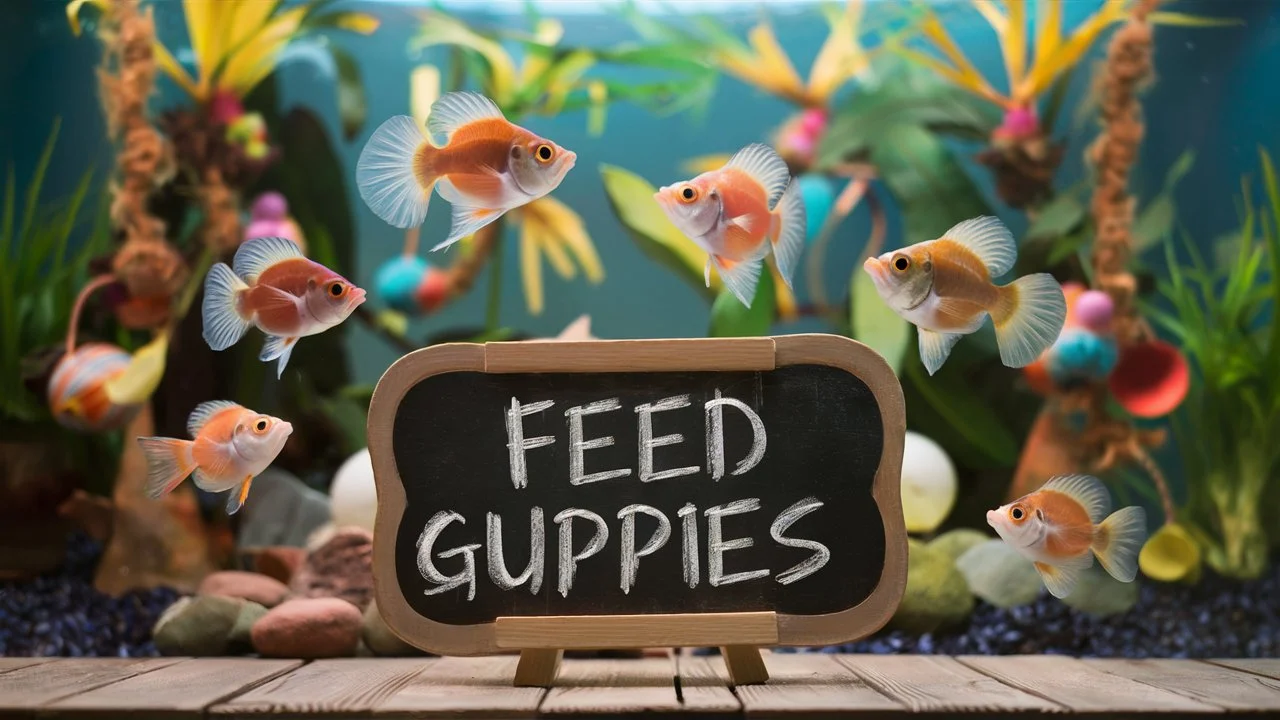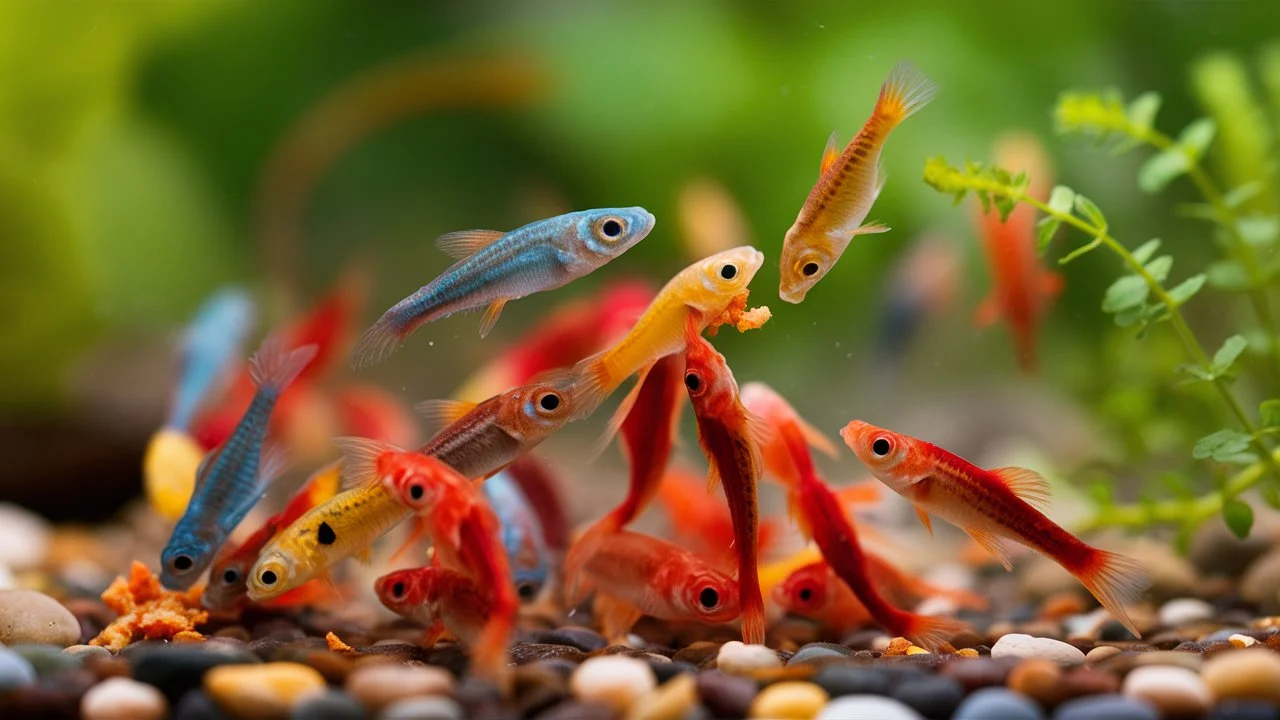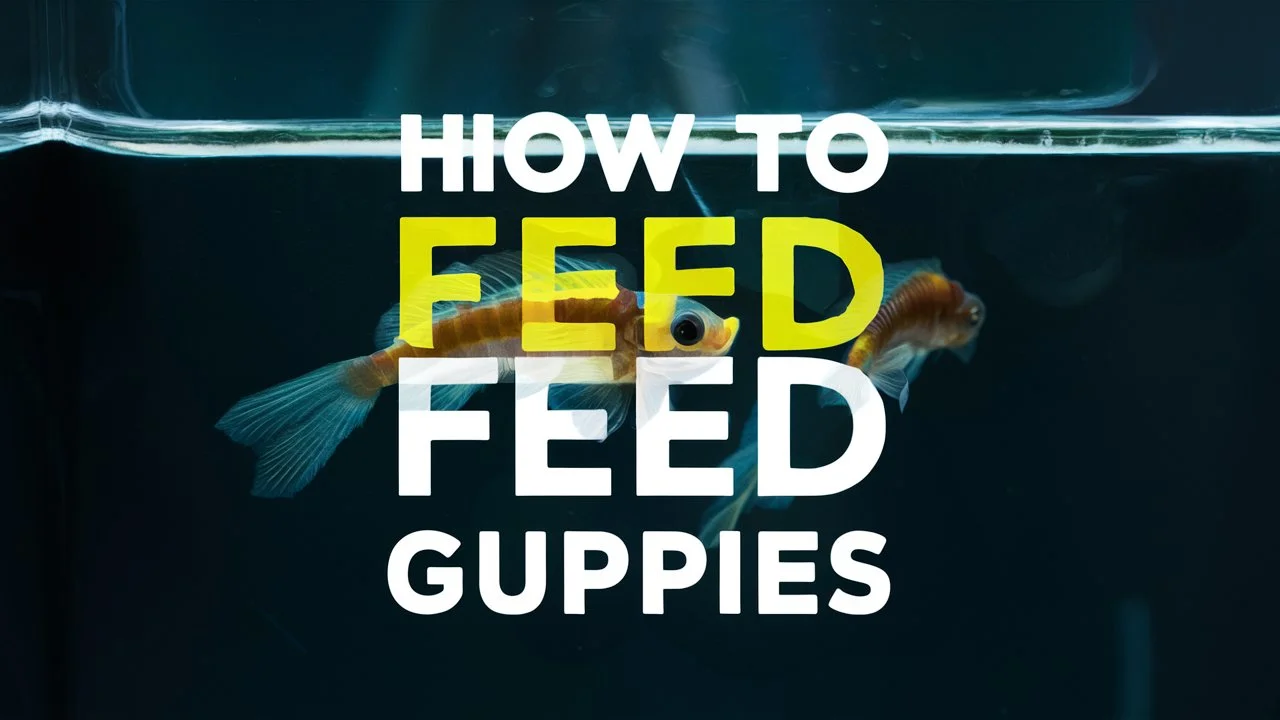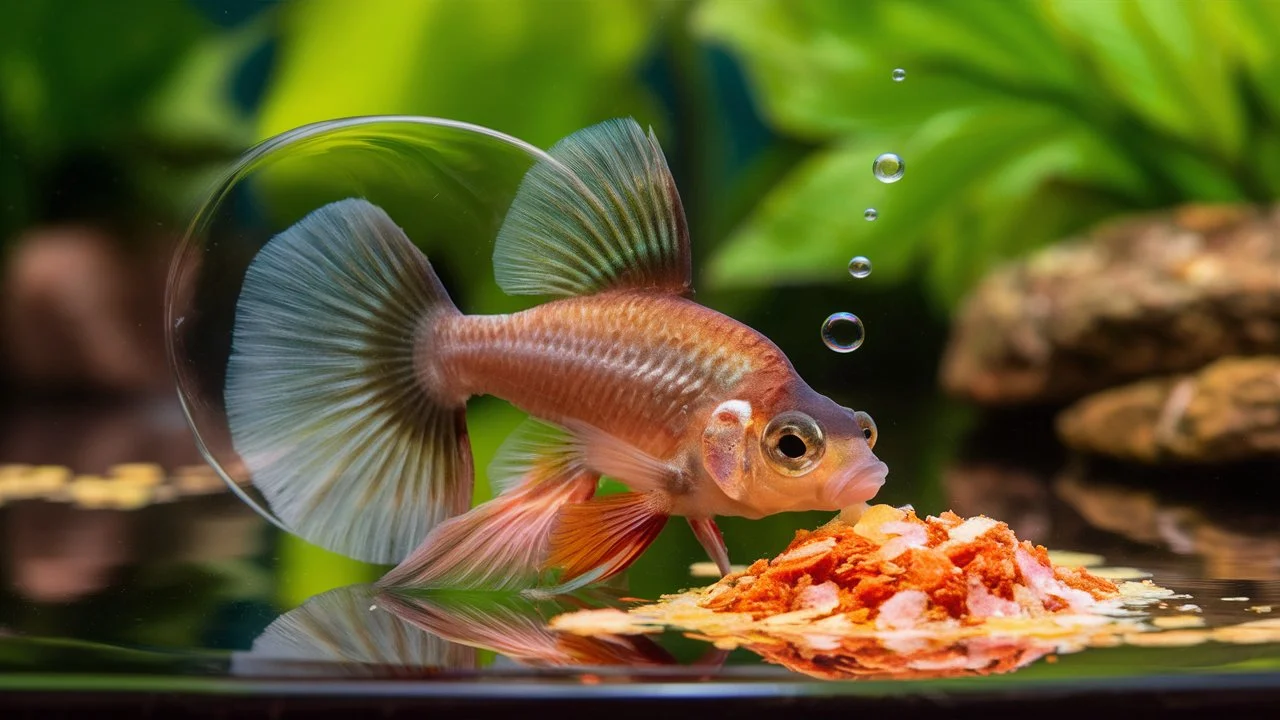Feeding your guppies is an important part of keeping them healthy and happy. Guppies are small and colorful fish that are easy to care for, making them a popular choice for many fish owners. In this guide, we’ll show you how to feed your guppies with simple, easy-to-understand steps.
Guppies need a balanced diet to stay healthy. They eat a variety of foods, including fish flakes, live food and vegetables. It’s important to feed them the right amount and type of food to ensure they get all the nutrients they need.
To feed guppies, use fish flakes from a pet store and feed them twice a day, once in the morning and once in the evening. Give a small pinch of food each time, as guppies have small stomachs. After about 2 minutes, remove any uneaten food to keep the water clean. Occasionally, add variety to their diet with brine shrimp or finely chopped vegetables for balanced nutrition. This simple routine will help keep your guppies healthy and happy.
Table of Contents
ToggleHow to Feed Guppies
Feeding your guppies properly is essential for their health and well-being.
Here’s a detailed guide to help you ensure your guppies get the nutrition they need.
Related reading: How long do guppies live without food?

1. Choose the Right Food
Guppies primarily eat fish flakes, which you can find at any pet store. Fish flakes are specially formulated to provide the vitamins and minerals guppies need. You can also offer them other foods for variety and better nutrition.
2. Feed Them Twice a Day
It’s best to feed your guppies twice a day. Give them food in the morning and again in the evening. This feeding schedule mimics their natural eating habits and keeps them active and healthy.
3. Use a Small Pinch of Food
Guppies have small stomachs, so they only need a small amount of food. Take a small pinch of fish flakes and sprinkle it on the surface of the water. Make sure the amount you give them can be eaten in about 2 minutes.
4. Remove Uneaten Food
After about 2 minutes, check to see if there is any food left in the tank. If there is, remove it using a net or a siphon. Leftover food can pollute the water, causing it to become dirty and potentially harmful to your guppies.
5. Add Variety to Their Diet
For a balanced diet, occasionally give your guppies other types of food. Here are some options:
- Live or Frozen Brine Shrimp: These are a great source of protein and can be given as a treat once or twice a week.
- Daphnia: Another good source of protein that guppies love.
- Finely Chopped Vegetables: Guppies can eat small pieces of vegetables like spinach or lettuce. Make sure to wash the vegetables thoroughly and chop them into tiny pieces.
6. Watch for Overfeeding
Overfeeding is a common mistake. If you notice that your guppies are getting bloated or the tank water is getting cloudy, you might be overfeeding them. Stick to small, controlled portions.
7. Observe Your Guppies
Watch your guppies while they eat. Healthy guppies will actively swim to the surface to eat. If some guppies are not eating or seem lethargic, they might be sick or stressed. Adjust their diet and check the water conditions if you notice any unusual behavior.
How to Feed Adult Guppies
Feeding adult guppies requires a balanced approach to ensure they receive all the necessary nutrients for their health and vitality. Here’s a detailed method that focuses on variety and proper feeding techniques:
1. Prepare a Variety of Foods
Adult guppies benefit from a diverse diet. In addition to standard fish flakes, include:
- Freeze-dried foods: Such as daphnia, bloodworms, and tubifex worms.
- Live foods: Brine shrimp, microworms, and mosquito larvae.
- Vegetables: Finely chopped spinach, peas, and lettuce.
2. Create a Feeding Schedule
Instead of feeding just twice a day, feed smaller portions more frequently. Aim for three to four feedings throughout the day to mimic their natural grazing behavior.
3. Measure the Food
Use a small measuring spoon for consistency. A 1/8 teaspoon of fish flakes or an equivalent amount of other foods per feeding is a good starting point for a small group of adult guppies.
4. Alternate Food Types
Rotate different foods to ensure a balanced diet:
- Day 1: Fish flakes in the morning, freeze-dried daphnia in the afternoon, and a small piece of vegetable in the evening.
- Day 2: Fish flakes in the morning, live brine shrimp in the afternoon, and fish flakes in the evening.
This variety helps prevent dietary deficiencies and keeps feeding time interesting for your guppies.
5. Feed in Small Amounts
Each feeding session should last no more than 1-2 minutes. Only give as much food as your guppies can consume within this time. If there is leftover food, reduce the amount in the next feeding.
6. Maintain Water Quality
Promptly remove any uneaten food after each feeding. This helps prevent the water from becoming polluted, which can harm your guppies. Use a small net or siphon to remove food particles.
7. Monitor Guppy Health
Observe your guppies for signs of overfeeding, such as bloating or excessive waste. Adjust the quantity and type of food as needed. Healthy adult guppies should be active and have vibrant colors.
8. Supplement with Vitamins
Occasionally, add liquid vitamins to the tank water or soak food in vitamins before feeding. This can help boost their immune system and overall health.
9. Keep a Consistent Routine
Stick to a regular feeding schedule to maintain your guppies’ health and behavior. Regular feeding times help reduce stress and keep them in optimal condition.
By following this method, you can ensure that your adult guppies receive a varied and balanced diet. Regularly changing the types of food and feeding times can keep your guppies healthy and active, providing them with all the necessary nutrients to thrive.
How to Feed Guppy Fry
Feeding guppy fry (baby guppies) requires special attention to ensure they grow up healthy and strong. Here’s a detailed method to help you feed your guppy fry properly:

1. Use Special Fry Food
Guppy fry need smaller, finely crushed food that they can easily eat. Here are some good options:
- Crushed Fish Flakes: Crush regular fish flakes into a fine powder.
- Baby Brine Shrimp: Live or frozen baby brine shrimp are an excellent source of protein.
- Commercial Fry Food: Available at pet stores, these are specifically designed for baby fish.
2. Feed Small Amounts Frequently
Guppy fry have tiny stomachs and need to eat more often than adult guppies. Feed them small amounts 3 to 5 times a day. This frequent feeding schedule helps them grow quickly.
3. Use a Small Pinch of Food
Give them just a tiny pinch of food each time. You can use your fingers or a small spoon to measure the amount. The food should be small enough for the fry to eat easily.
4. Maintain Clean Water
Because guppy fry eat more often, uneaten food can quickly dirty the water. Remove any leftover food after a few minutes using a net or a siphon. Regularly clean the tank to keep the water quality high.
5. Supplement with Live Foods
Live foods like baby brine shrimp or microworms provide essential nutrients and encourage natural hunting behavior. You can give live food once or twice a day as a supplement to their regular diet.
6. Monitor Fry Growth and Health
Watch your fry closely to ensure they are eating well and growing. Healthy fry will be active and have a rounded belly after feeding. If you notice any fry that are not eating or growing, adjust their diet or check water conditions.
7. Adjust Feeding as They Grow
As the fry grow, you can gradually increase the size of the food particles. Move from powdered food to finely crushed flakes and then to larger flakes or pellets as they get bigger.
8. Keep a Consistent Routine
Consistency is key. Stick to a regular feeding schedule to ensure your fry get the nutrition they need to grow strong and healthy.
9. Avoid Overfeeding
Overfeeding can lead to poor water quality and health issues for the fry. Feed them only what they can eat in a few minutes and remove any excess food promptly.
By following these steps, you can provide your guppy fry with the best possible care. Proper nutrition and clean water are crucial for their development, and with a little attention, your guppy fry will grow into healthy adult guppies.
Conclusion:
Feeding guppies is simple if you follow the right steps. Use fish flakes as their main food and feed them small amounts twice a day. Remember to remove any uneaten food to keep the water clean. Adding variety with live or frozen foods and vegetables can keep your guppies healthy and happy. By following these easy tips, your guppies will thrive and bring joy to your aquarium. Happy feeding

